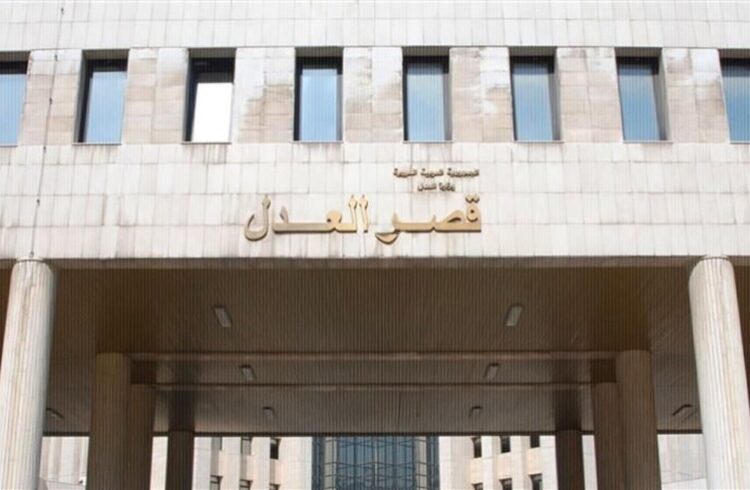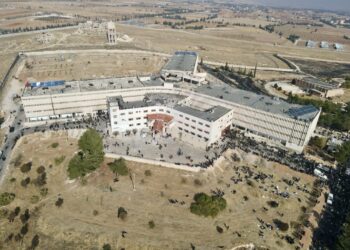The announcement of the establishment of the Arab Network for the Independence of the Judiciary on July 10, 2025, represents a qualitative shift in the trajectory of regional initiatives that could contribute to supporting the political transition in Syria toward a system that respects judicial independence, after decades of its exploitation as a tool by the Assad regime to consolidate its power.
This initiative comes at a time when Syria’s judicial institutions are suffering from severe crises of legitimacy and effectiveness, making the establishment of a framework for regional judicial cooperation a crucial step toward addressing this profound structural collapse caused by authoritarian hegemony.
In this context, Syria’s participation in the network, through its membership in the Syrian Network for Human Rights, takes on a special character. The Syrian Network’s rich documentation, which includes millions of incidents and more than 1,800 reports since 2011, provides the Arab Network with a reference database for understanding the judicial challenges in Syria and enables it to formulate responses based on concrete reality. It is hoped that this data will contribute to making Syria not only a beneficiary of regional expertise, but also a contributor to its enrichment by providing vital field expertise in the context of rebuilding a post-conflict judicial system.
This article aims to analyze the role that the Arab Network for the Independence of the Judiciary can play as a supportive mechanism in the political transition process in Syria, by providing the technical expertise and sustainable institutional support necessary to overcome the legacy of accumulated judicial collapse.
Addressing Weaknesses Through Regional Judicial Cooperation
The crisis of judicial independence in Syria is one of the most significant obstacles to consolidating the rule of law in the post-Assad era. Decades of authoritarian abuse of the judiciary have transformed it from a fair adjudication authority into a tool for the regime’s survival, creating what is known as a “legitimacy vacuum” that cannot be filled through technical reforms alone. This institutional erosion translates into citizens’ reluctance to resort to the judiciary, or a growing tendency to “take matters into their own hands,” indicating a collapse in public confidence in the judiciary.
In this context, the Syrian Constitutional Declaration, which was drafted to frame the transitional phase, constitutes a consolidation of the executive branch’s dominance rather than a constraint on it. Human Rights Watch’s assessment shows that the declaration grants the president broad powers, including judicial and legislative appointments, without effective oversight, reflecting a flaw in the country’s political transition structure. The absence of explicit constitutional provisions enshrining the separation of powers and providing effective guarantees for judicial independence renders this declaration a legal mandate for continued executive interference.
The Constitutional Declaration granted the president the authority to form the Supreme Constitutional Court, neglected to establish an independent judicial council, failed to set clear criteria for judicial appointment and dismissal, and omitted mechanisms to protect against political retaliation. Furthermore, the lack of constitutional guarantees regarding judicial tenure, budgetary independence, and administrative decisions leaves judges in a vulnerable position, subject to pressure from the executive branch.
Building Sustainable Judicial Capacity: Addressing the Human Capital Crisis
The judicial human capital crisis in Syria is one of the most pressing challenges in rebuilding the national legal system. The “severe shortage of qualified judges” is the result of a combination of factors, most notably: the departure of a large number of judges during the armed conflict and their involvement with civil society organizations or political bodies; the systematic purge of independent-minded judges during the Assad regime; and the chronic deterioration of legal education institutions under authoritarian rule. This deficit is not limited to quantity; it also extends to the quality of the remaining judicial personnel, who often lack training in international human rights standards, transitional justice mechanisms, and judicial practices consistent with a democratic system.
The issue of reintegrating judges who defected during the regime’s rule, despite its symbolic nature, highlights the complexities of restructuring the human structure of the judiciary. The reintegration process must include rehabilitation that goes beyond the technical legal dimension to address the psychological and social aspects associated with return, including the potential for tensions with judges who continued to work within the regime’s system.
Beyond individual challenges, there is an urgent need to build sustainable institutional channels for judicial recruitment and training. The deteriorating legal education infrastructure in Syria makes traditional capacity building difficult. Law schools still employ outdated curricula and suffer from a scarcity of practical training resources.
In this context, the role of the Arab Network for the Independence of the Judiciary goes beyond providing direct training to include adopting integrated capacity-building strategies. Through regular exchange programs with regional judicial bodies, Syrian judges can gain practical experience in more advanced legal systems and build ongoing professional networks that provide them with long-term cognitive and institutional support. These programs must be carefully designed to ensure their suitability to the specific needs of the Syrian context, while avoiding the imposition of inadaptable foreign legal models. Professional mentoring arrangements that enable Syrian judges to connect with experienced Arab judicial counterparts are a crucial step toward building lasting institutional relationships that facilitate knowledge transfer beyond formal training frameworks.
Effective Mechanisms for Transferring Judicial Knowledge
Adapting regional best practices in transitional justice to Syria’s specific context requires precise legal and institutional translation mechanisms that take into account Syria’s unique historical, social, and political context. Although the experiences of other Arab countries offer rich analytical insights, mechanically replicating these models risks producing formal institutions unable to engage with the Syrian reality. The challenge lies in deriving generalizable principles and adapting them in a way that maintains their local legitimacy and practical effectiveness.
Regional experiences—such as the Truth and Reconciliation Commission in Tunisia, the Equity and Reconciliation Commission in Morocco, and post-civil war arrangements in Lebanon—provide valuable lessons on the delicate balance between accountability and stability, a central issue in the post-conflict Syrian context. The Arab Network provides a platform that brings together these diverse experiences, enabling Syrian judges to examine successes and failures within similar legal and political environments.
The process of transferring judicial knowledge must simultaneously address interconnected dimensions, including legal procedural aspects, institutional design principles, and the political economy of reform processes. In this context, technical support programs that are limited to transferring formal legal mechanisms often fail to address deeper issues related to the transformation of judicial culture and practice. Effective knowledge transfer requires immersive application environments in which Syrian judges actively participate in transitional justice processes, enabling them to understand the formal procedures, as well as the informal norms and real-world practices that ensure the effectiveness of these processes.
The Syrian context poses unique challenges that must be considered when designing knowledge transfer tools. These include the need for Arabic-language educational resources compatible with local legal traditions and the development of training curricula that take into account the country’s complex sectarian dynamics. The effectiveness of the Arab Network for the Independence of the Judiciary ultimately depends on its ability to facilitate a genuine professional and institutional dialogue between multiple legal traditions within the Arab region.
The Syrian Network for Human Rights’ Pivotal Role
The Syrian Network for Human Rights’ position as a founding member of the Arab Network for the Independence of the Judiciary enables it to link field documentation with executive policymaking. The network’s extensive database—which includes millions of incidents and nearly 1,800 reports and statements since 2011—constitutes a pilot foundation for evidence-based judicial reform.
The Syrian Network for Human Rights’ contribution goes beyond providing information. It extends to providing analytical frameworks for understanding patterns of violations, the context of political transition, and the requirements of transitional justice in Syria. Thanks to this cumulative knowledge, the Syrian Network for Human Rights contributes to translating the general principles of transitional justice into practical mechanisms that take into account Syrian specificities, while ensuring the participation of these experiences in broader regional and international discussions.
The Syrian Network for Human Rights’ civil society-based perspective offers vital insights often overlooked in state-centered judicial reforms. The Syrian Network for Human Rights’ direct relationship with victims and local communities provides a window into citizens’ aspirations, concerns, and priorities, essential elements for guiding judicial system reconstruction efforts. This community-based knowledge is particularly valuable in designing approaches that place victims at the center of the judicial process and balance formal legal formulations with the imperatives of community recovery.
A Platform for Consolidating the Pillars of Democratic Governance
The above analysis demonstrates that the Arab Network for the Independence of the Judiciary goes beyond being a mere institutional framework for technical cooperation, becoming a strategic tool at a pivotal historical moment. By addressing shortcomings and limited local capacities, the network proposes a path toward transforming the Syrian judiciary from an instrument of hegemony into a pillar of pluralistic governance.
However, achieving this transformation cannot depend solely on the network’s structure itself. Rather, it hinges on its ability to navigate complex political equations while simultaneously maintaining its professional credibility and regional authenticity. Recognizing the network’s capabilities must not obscure its objective limitations in challenging entrenched power structures, as the continued interference of the executive branch clearly demonstrates the extent of the entrenchment of centralized practices, which cannot be dismantled through regional cooperation alone.
The Network’s effectiveness is closely linked to the willingness of Syrian political actors to accept regional monitoring and implement reform recommendations. In the absence of such commitment, the network’s capacity remains limited to technical aspects, unable to effectively influence the course of the political transition.
Building Institutional Capacity to Confront Democratic Backsliding
The network’s role is not limited to providing short-term technical support; it also includes contributing to building the resilience of Syrian judicial institutions for the long term. The integration of these institutions within regional accountability networks contributes to creating deterrence mechanisms that make a return to authoritarianism a costly and politically vulnerable option. Building professional networks that connect Syrian judges with their regional counterparts also creates transnational judicial support circles based on shared global professional standards and mutual support systems that constitute a bulwark against the slide toward isolated authoritarianism.
This preventive dimension operates on several integrated levels, including periodic peer reviews that monitor early indicators of judicial dominance, technical support programs that continually strengthen democratic practices, and regional diplomatic pressure mechanisms to counter institutional decline. The network’s monitoring and documentation activities provide a rich institutional record that enables the development of accurate, evidence-based responses to address emerging challenges.
Reciprocal regional impact: The ramifications of strengthening judicial independence in Syria transcend national borders, enriching the judicial reform project across the Arab world. Syria’s experience of transitioning from authoritarian Assad rule to a system seeking judicial independence offers a rich analytical opportunity for Arab countries undergoing similar transitions. The network’s engagement with the complexities of the Syrian context—from sectarian divisions, institutional collapse, to conflicting external influences—produces knowledge applicable to other conflict-affected environments.
As the Syrian judicial experience gradually develops, Syria can transform from a recipient of knowledge to a source of it, contributing to enriching the regional knowledge base in the field of building post-conflict judicial systems.
Conclusion
The Horizon of Justice and Restoring Trust: Ultimately, the Arab Network for Judicial Independence embodies a catalyst—albeit insufficient in itself—for bringing about a significant transformation in the Syrian judicial structure. Its contribution to bridging technical gaps, enhancing regional legitimacy, and providing ongoing support constitutes pillars that no single local effort can replace. The network’s advanced mechanisms for knowledge transfer, capacity building, and institutional monitoring lay the foundations for sustainable judicial independence.
But achieving this goal requires more than technical support: it requires profound cultural shifts in political awareness and a reshaping of the relationship between power and society. These are transformations that external support may help accelerate, but it cannot impose.
The success of rebuilding the Syrian judiciary will be measured not only by the creation of new institutions, but also by their ability to establish public trust: Do citizens feel that the courts are able to protect them? Do judges have the ability to rule against the state without fear of retribution? Will legal accountability replace political violence as a means of resolving disputes?
The Arab Network for the Independence of the Judiciary provides a framework to support this transformation, but the success of the mission depends on genuine societal adoption of the idea of judicial independence as a necessary condition for any stable democratic system. In this struggle, regional support represents technical assistance and also embodies tangible hope that, despite all the difficulties, the path of Syrian justice will bend toward independence, accountability, and the rule of law.






